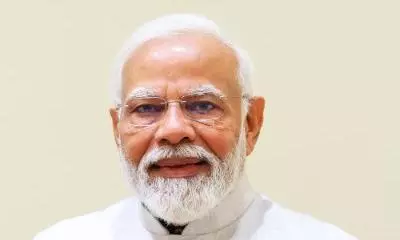Opposition spreading caste venom: PM

NEW DELHI: Hitting out at the Opposition for trying to weaken society by spreading venom in the name of caste, Prime Minister Narendra Modi on Saturday urged people to thwart these conspiracies and preserve the shared culture of the village. The PM said his government has been focusing on rural development because villages will play a key role in achieving the Viksit Bharat goal by 2047.
Speaking after inaugurating Grameen Bharat Mahotsav 2025 at Bharat Mandapam in the national capital, Mr Modi said that his government has launched a campaign to guarantee basic amenities in every village. In a veiled attack on the Opposition leaders, he said that some people are trying to spread poison in society in the name of caste and weaken the social fabric.
Noting the significance of harmony and love in village identity, Mr Modi urged, “We have to thwart these conspiracies and preserve and strengthen the shared culture of the villages.”
The Prime Minister said that since 2014, he has been constantly in the service of rural India. “Ensuring a dignified life for the people of rural India is the priority of my government,” he said, adding that their vision was to ensure an empowered rural India, provide ample opportunities for villagers, reduce outmigration and ensure ease of life of the people of villages.
“The government had implemented a programme in each and every village to ensure basic amenities,” Mr Modi said and highlighted that every house was provided with a toilet as part of the Swachh Bharat Mission, crores of people in rural India were given pucca houses as part of PM Awaas Yojana and lakhs of houses in villages were ensured safe and clean drinking water through Jal Jeevan Mission.
“Today, health facilities are being provided in more than 1.5 lakh Ayushman Arogya Mandirs to the people,” said the Prime Minister. He added that telemedicine, assisted by digital technologies, has ensured the option of the best doctors and hospitals to the villages.
Mr Modi noted that during the Covid-19 pandemic, the world wondered how India's villages would cope. The government, however, ensured that vaccines reached the last person in every village.
The Prime Minister highlighted the importance of creating economic policies that consider every section of rural society to strengthen the rural economy and said that over the past 10 years, the government has formulated special policies and made decisions for every section of the village.
He mentioned that just a few days ago, the Union Cabinet approved the extension of the PM Crop Insurance Scheme for another year and decided to continue the subsidy on DAP fertilisers.
The Prime Minister noted that through the PM Kisan Samman Nidhi, farmers have received approximately `3-lakh crores in financial assistance. Noting that over the past 10 years, the amount of agricultural loans has increased by 3.5 times, Mr Modi further mentioned that now livestock and fish farmers are being provided with Kisan Credit Cards and more than 9,000 farmer producer organisations (FPOs) in the country are receiving financial assistance.
The Prime Minister underlined that the government has consistently increased the MSP for several crops over the past 10 years. He highlighted the significant contribution of cooperatives in transforming the rural landscape and remarked that India is on the path to prosperity through cooperation, and for this purpose, the ministry of cooperation was established in 2021.
The Prime Minister further noted that around 70,000 primary agricultural credit societies (PACS) are being computerised to ensure that farmers and villagers get better value for their products, thereby strengthening the rural economy.
“When intentions are noble, the results are satisfying,” he said.
Citing a recent large-scale survey, the Prime Minister stated that compared to 2011, consumption in rural India has nearly tripled, indicating that people are spending more on their preferred items.
Mr Modi noted that previously, villagers had to spend more than 50 per cent of their income on food, but for the first time since Independence, the expenditure on food in rural areas has fallen below 50 per cent. “This means the people are now spending on other desires and needs, improving their quality of life,” he explained.
Highlighting another significant finding from the survey, which revealed that the gap in consumption between urban and rural areas has decreased, the Prime Minister remarked that it was previously believed that urban individuals could spend more than those in villages, but continuous efforts have reduced this disparity.
“Numerous success stories from rural India inspire us,” he said.
The Prime Minister further stated that these achievements could have been realised during previous governments' tenures, but for decades after Independence, lakhs of villages were deprived of basic necessities.
Mr Modi said that over the past 10 years, his government has corrected many mistakes of previous governments and emphasised that his government is moving forward with the mantra of national development through rural development.
The Prime Minister pointed out that as a result of these efforts, 25-crore people have been lifted out of poverty in the past 10 years, with the majority being from rural areas.
The Prime Minister also mentioned a recent study by the State Bank of India, which revealed that rural poverty in India has decreased from approximately 26 per cent in 2012 to less than five per cent in 2024.
“While some people have been chanting slogans to eradicate poverty for decades, the country is now witnessing a real reduction in poverty,” he added.

